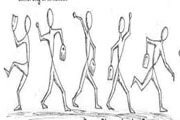Students need to excel in reading and writing, but there are many smart kids who experience difficulties because they have dyslexia. Learn more about this learning disability that affects 15-20% of school-aged children.
Dyslexia - What Is It?
Dyslexia is a learning disability that affects a person's ability to read, write, and spell. As well, organization, sequencing, mathematics, concentration, and short-term memory may be affected. Dyslexia comes from the Greek word, dys, which means abnormal or impaired, and lexis, which refers to language or words. The belief that people with dyslexia see letters backwards is a myth. Rather, people with this learning disability may reverse words, letters, and numbers, write letters back to front, forget the sequence of letters in a word, or sometimes even read from right to left.
Dyslexia - The Cause
At first, many people thought dyslexia was caused by vision problems, so early treatments involved eye exercises or glasses with tinted lenses. Researchers now believe dyslexia is caused by the brain's inability to process written words normally. Pictures of the brain show that when people with dyslexia read, they use different parts of the brain than people without dyslexia. Dyslexia is not only caused by neurological factors, but also by inheritance. People are born with it, and it often runs in the family. It affects all kinds of people regardless of intelligence, race, or social class.
Dyslexia - The Symptoms
- Letter or word reversals when reading, such as b/d, p/q, and was/saw.
- Letter or word reversals when spelling and writing.
- Difficulty in recognizing individual sounds in words.
- Difficulties in naming things.
- Difficulty reading from left to right.
- Problems with getting things in the right order.
Dyslexia - The Treatment
Dyslexia is not a disease, so there is no cure. With proper diagnosis, appropriate instruction, and hard work, people with dyslexia can overcome it. By building their sight vocabulary, they can learn to read and write with greater fluency and comphrehension by reducing the need to stop and attempt to sound out an unrecognized word.
Related Stories:
- Simon Gets Diagnosed With Dyslexia
- The 411 on ADHD
- An Encounter With Epilepsy
- Dealing With an Eating Disorder
- More Health And Body Info

































